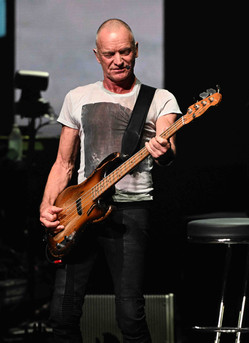Sting's Message In a Bottle Hits Hard Rock Live in Hollywood, Florida And Magic Pours Out
- Joanie Cox Henry
- Nov 8, 2025
- 4 min read
By Joanie Cox Henry

There are nights when the veil between performer and audience dissolves entirely, when decades of distance collapse into a single shared breath, when a man who could rest comfortably on his laurels instead chooses to strip everything down to bone and sinew and see what remains. Last night at Hard Rock Live in Hollywood, Fla., was such a night—raw, intimate, and achingly beautiful. Sting arrived not as monument but as musician, accompanied by only two kindred spirits, and proceeded to remind us why these songs have burrowed so deep into our collective consciousness. In a time of over the top spectacle and artificial filters, Sting offered something far more radical: simplicity, honesty, and the kind of connection that can only happen when artifice falls away.
With just two musicians flanking him—guitarist Dominic Miller and drummer Chris Maas, Sting transformed the sold out, 7,000 seat venue an intimate space of sacred simplicity and sound demonstrating less is so much more. Sting was in night one of a two day run at Hard Rock Live in Hollywood, Fla., Nov. 7-8.
"Last night I saw a guy having fun playing music with a couple of other guys," observed Fernando Santomaggio, a South Florida bass player and lifelong Sting devotee experiencing this particular lineup for the first time. It's a deceptively simple observation that cuts to the heart of what made the evening so magical. Despite the trappings of fame—and yes, as Santomaggio quipped, "He's STING! He lives in a castle, for fuck's sake!"
Sting 3.0 was pure, unadulterated joy in the act of music-making. The setlist offered Police classics and Sting's solo career touchstones with the ease and wisdom of a sacred storyteller. Opening with the urgent reggae pulse of "Message in a Bottle," Sting immediately established the evening's paradox: how could three people possibly generate this much sound? No backing tracks, no studio wizardry, no safety nets—just three musicians locked into a telepathic groove that seemed to defy physics.
"I was amazed at the amount of sound produced by three people," Santomaggio noted. "No backing tracks, nothing extra."
"Every Little Thing She Does Is Magic" sparkled with all its original luminescence, while "Englishman in New York" swayed with sophisticated grace. Then "Fields of Gold" emerged like a harvest moon rising over the Atlantic.
Miller's guitar work deserves particular praise—a study in elegant economy. "Dominic likely spent more time NOT playing than playing, yet what he did was exactly enough," Santomaggio observed.
In the spaces between notes, Miller allowed Sting's voice and bass to breathe, to haunt, to seduce. His shimmering arpeggios on "Shape of My Heart" and "Desert Rose" didn't just complement Sting's vocals—they conversed with them, creating a dialogue between yearning and resolution.
And then there was Sting himself, occupying what Santomaggio beautifully described as a "somewhat paradoxical" role—simultaneously "the 'cake,' the foundation of the music, and the 'icing,' in the form of his haunting vocals and storytelling." His bass playing was muscular and authoritative, anchoring "Can't Stand Losing You" and "Driven to Tears" with that unmistakable pulse that defined The Police's sound.
"It was obvious that Sting has a deep regard for the role of the bass guitar," Santomaggio noted. "His playing was very powerful!"
But it was in his voice—that instrument of seduction and sorrow—where the evening truly soared. At 73, Sting's vocal flavoring remains formidable. "Why Should I Cry for You?" and "Mad About You" showcased a tenderness that comes only with age and experience, while "Walking on the Moon" and "So Lonely" retained their otherworldly quality, Sting's voice floating above the rhythm like smoke over water.
What struck Santomaggio most forcefully was the respect Sting brought to his own material. "I could tell that he has a respect for those songs. I know he's played them thousands of times, but there was no sense of just 'going through the motions," Santomaggio added. "He played each song as if it was the first time!"
The crowd responded with the fervor of true believers. "When Sting tells you to clap, you clap!" Santomaggio laughed. "When Sting tells you to sing, you SING, damnit!!!" And sing they did—a full-throated chorus on "Every Breath You Take" that transformed the venue into something resembling a very sophisticated tent revival.
The encores—"Roxanne" delivered with raw, funky urgency, followed by the hauntingly beautiful "Fragile"—provided the perfect denouement. As Sting's voice wrapped around those final, delicate lines about how fragile we all are, the room held its collective breath. It was a reminder that great songs don't need elaborate production; they need only truth, skill, and soul.
"It's a testament to the quality of Sting's songwriting that the songs sounded so full, so complete, despite being played by a minimalist ensemble," Santomaggio reflected. "In truth, he could've sung them alone, with no accompaniment, and they would've been every bit as sublime."
Perhaps that's the ultimate compliment to an evening that proved Sting isn't just cashing in on past glories. "He's still got it," Santomaggio concluded. "Not just his ability to sing, but his musical sensibility!"
And as Santomaggio's final assessment suggested—"All men are created equal, but Sting is considerably more equal than all others!"
Friday night at Hard Rock Live was a reminder that true artistry doesn't diminish with time. It deepens, it refines, it endures.
Some nights are just concerts. This was something more. Sting is still a seeker. And while he may always be "King of Pain," he leaves his audience with one promise—"If I ever lose my faith in you...There'd be nothing left for me to do."
All images by Larry Marano:







































































































































Comments